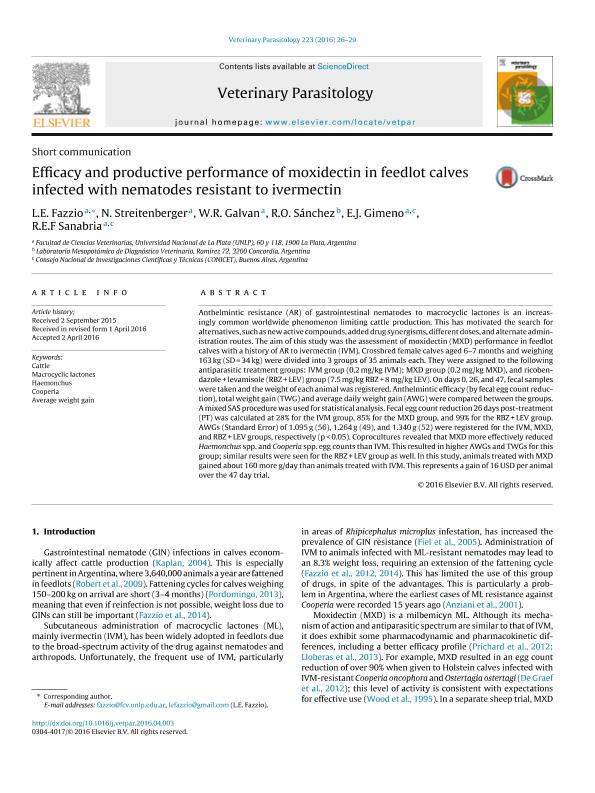Artículo
Efficacy and productive performance of moxidectin in feedlot calves infected with nematodes resistant to ivermectin
Fazzio, Luis Emilio; Streitenberger, Nicolás; Galvan, Walter Ruben; Sánchez, R. O.; Gimeno, Eduardo Juan ; Sanabria, Rodrigo Eduardo Fabrizio
; Sanabria, Rodrigo Eduardo Fabrizio
 ; Sanabria, Rodrigo Eduardo Fabrizio
; Sanabria, Rodrigo Eduardo Fabrizio
Fecha de publicación:
06/2016
Editorial:
Elsevier Science
Revista:
Veterinary Parasitology
ISSN:
0304-4017
Idioma:
Inglés
Tipo de recurso:
Artículo publicado
Clasificación temática:
Resumen
Anthelmintic resistance (AR) of gastrointestinal nematodes to macrocyclic lactones is an increasingly common worldwide phenomenon limiting cattle production. This has motivated the search for alternatives, such as new active compounds, added drug synergisms, different doses, and alternate administration routes. The aim of this study was the assessment of moxidectin (MXD) performance in feedlot calves with a history of AR to ivermectin (IVM). Crossbred female calves aged 6-7 months and weighing 163 kg (SD = 34 kg) were divided into 3 groups of 35 animals each. They were assigned to the following antiparasitic treatment groups: IVM group (0.2 mg/kg IVM); MXD group (0.2 mg/kg MXD), and ricobendazole + levamisole (RBZ + LEV) group (7.5 mg/kg RBZ + 8 mg/kg LEV). On days 0, 26, and 47, fecal samples were taken and the weight of each animal was registered. Anthelmintic efficacy (by fecal egg count reduction), total weight gain (TWG) and average daily weight gain (AWG) were compared between the groups. A mixed SAS procedure was used for statistical analysis. Fecal egg count reduction 26 days post-treatment (PT) was calculated at 28% for the IVM group, 85% for the MXD group, and 99% for the RBZ + LEV group. AWGs (Standard Error) of 1.095 g (56), 1.264 g (49), and 1.340 g (52) were registered for the IVM, MXD, and RBZ + LEV groups, respectively (p < 0.05). Coprocultures revealed that MXD more effectively reduced Haemonchus spp. and Cooperia spp. egg counts than IVM. This resulted in higher AWGs and TWGs for this group; similar results were seen for the RBZ + LEV group as well. In this study, animals treated with MXD gained about 160 more g/day than animals treated with IVM. This represents a gain of 16 USD per animal over the 47 day trial.
Palabras clave:
Average Weight Gain
,
Cattle
,
Cooperia
,
Haemonchus
,
Macrocyclic Lactones
Archivos asociados
Licencia
Identificadores
Colecciones
Articulos(CCT - LA PLATA)
Articulos de CTRO.CIENTIFICO TECNOL.CONICET - LA PLATA
Articulos de CTRO.CIENTIFICO TECNOL.CONICET - LA PLATA
Citación
Fazzio, Luis Emilio; Streitenberger, Nicolás; Galvan, Walter Ruben; Sánchez, R. O.; Gimeno, Eduardo Juan; et al.; Efficacy and productive performance of moxidectin in feedlot calves infected with nematodes resistant to ivermectin; Elsevier Science; Veterinary Parasitology; 223; 6-2016; 26-29
Compartir
Altmétricas



